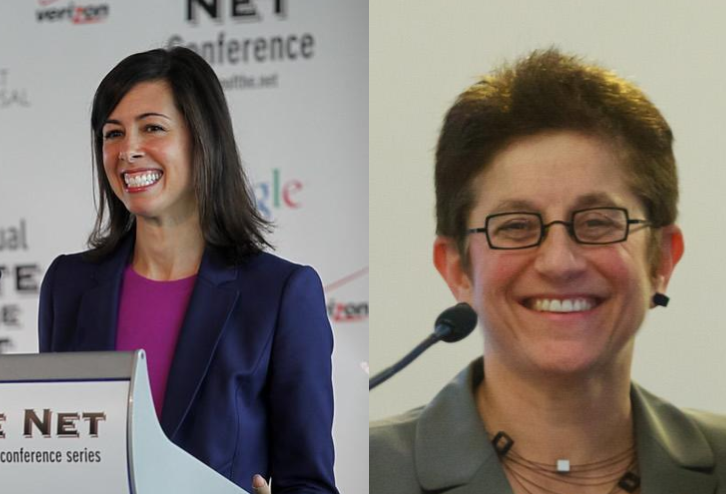 "FCC Commissioner Jessica Rosenworcel" by the Internet Education Foundation and "Gigi Sohn" by Joel Sage both licensed under CC BY 2.0
"FCC Commissioner Jessica Rosenworcel" by the Internet Education Foundation and "Gigi Sohn" by Joel Sage both licensed under CC BY 2.0
It’s about 280 days into Biden’s Presidency and he has finally decided to designate Federal Communications Commission Acting Chair, Jessica Rosenworcel as permanent Chair.
Along with Rosenworcel’s Chair nomination, comes the nomination of Gigi Sohn, a long-time democratic advocate, not just for Title II net neutrality and a host of other socialist plans, but was also never shy about using Title II net neutrality as a method for federal broadband rate regulation.
Biden’s delayed nomination of Jessica Rosenworcel to FCC Chair that is a mere two months before her required departure from the FCC, does not create an artificially expedited timeline for Sohn’s confirmation. Nor should Republicans feel pressure to carry water for Biden and Senate Democrats slow process.
Even with the overall lag in nominations, the FCC was expected to be a key player in the administration’s assault on American free markets as outlined in Biden’s July 9 executive order on competition (which calls on the FCC to reimpose net neutrality) and shored up by the nomination of Federal Trade Commission Chair Lina Khan, who was initially nominated as Commissioner and only elevated to Chair after she was confirmed by the Senate.
It would seem that the Administration is not back-dooring its more progressive nomination, Sohn, to the FCC by first elevating Rosenworcel to the Chair position. However, Republicans should not take this as a comfort.
Though Rosenworcel, a long-time telecommunications professional on both the Hill and at the FCC, is seen as relatively moderate in the current environment, she would require Sohn’s vote to get through anything on her markedly progressive agenda, and a guarantee that items that could have passed in a bipartisan fashion will instead become part of a radical left-wing agenda.
Republicans are under no circumstances are responsible for both of these nominations to go through before the end of the year. Senate democrats will likely want to confirm Rosenworcel quickly because she is serving in a “holdover” period after her term expired last year. If she is not confirmed by the end of this year, she will have to leave the FCC until confirmation, something she experienced in 2016-17 as well.
Due to the limited number of legislative days in the calendar, odds are against final Senate confirmation this year. That is a problem of Biden’s own making; not that of Senate Republicans.
Sohn’s nomination in particular should not be on an artificial rush. She is seen as a controversial figure and could require the Vice President’s tie-breaking vote in the Senate. While serving as Senior Advisor to former FCC Chairman Tom Wheeler, she shepherded the Title II version of net neutrality that imposed burdensome regulations and cause broadband investment to decrease for the first time outside of a recession, supported price regulation on broadband, lead the FCC’s unlawful attempt to preempt state laws restricting municipal broadband, and pushed for asymmetric privacy rules on Internet service providers and tech companies that were later revoked with the Congressional Review Act.
The Biden Administration is looking to create an artificial time crunch to push through exceeding controversial nominations at the FCC. If Rosenworcel’s nomination had occurred by springtime, which appears to be customary looking at the history of nominations and confirmations from presidents Reagan through Trump (see list below), the FCC would not be on the brink of falling into de facto Republican control. Sohn’s confirmation should not be linked to Rosenworcel’s end of year deadline to leave the FCC.
Without Rosenworcel’s confirmation, democratic Commissioner Geoffrey Starks would set the agenda, but he would be up against a republican majority, likely leading to a continuation of the bipartisanship we are seeing at the FCC right now.
With Rosenworcel’s unexpectedly quick confirmation, the FCC could continue its bipartisan business as it has thus far. In fact, under Republican FCC Chairman Pai the majority of votes were bipartisan as well.
With Sohn’s confirmation alongside Rosenworcel’s, we will see the FCC devolve into partisan politics and continuations of policy’s that have already been shown not to work, Title II net neutrality being chief among those.
FCC Chair Days until Confirmation after Nomination, Reagan through Trump
- Trump: Pai immediately designated as chair January 2017Pai was re-nominated for another full term 3/7/2017, confirmed 10/2/2017 (209 days)
- Obama second term: Wheeler nominated 5/1/2013, confirmed 11/4/2013 (187 days)
- Obama first term: Genachowski nominated 3/3/2009, confirmed 6/29/2009 (118 days)
- W. Bush second term: Martin designated chair March 2005. Martin was re-nominated for another full term 4/25/2006, confirmed 11/17/2006 (206 days)
- W. Bush first term: Powell immediately designated as chair January 2001Clinton second term: Kennard nominated 7/25/1997, confirmed 10/29/1997 (96 days)
- Clinton first term: Hundt nominated 6/3/1993, confirmed 11/19/1993 (142 days)
- H.W. Bush: Sikes nominated 6/28/1989, confirmed 8/4/1989 (41 days)
- Reagan second term: Patrick designated as chair 2/5/1987
- Reagan first term: Fowler nominated 3/14/1981, confirmed 5/15/1981 (61 days)

